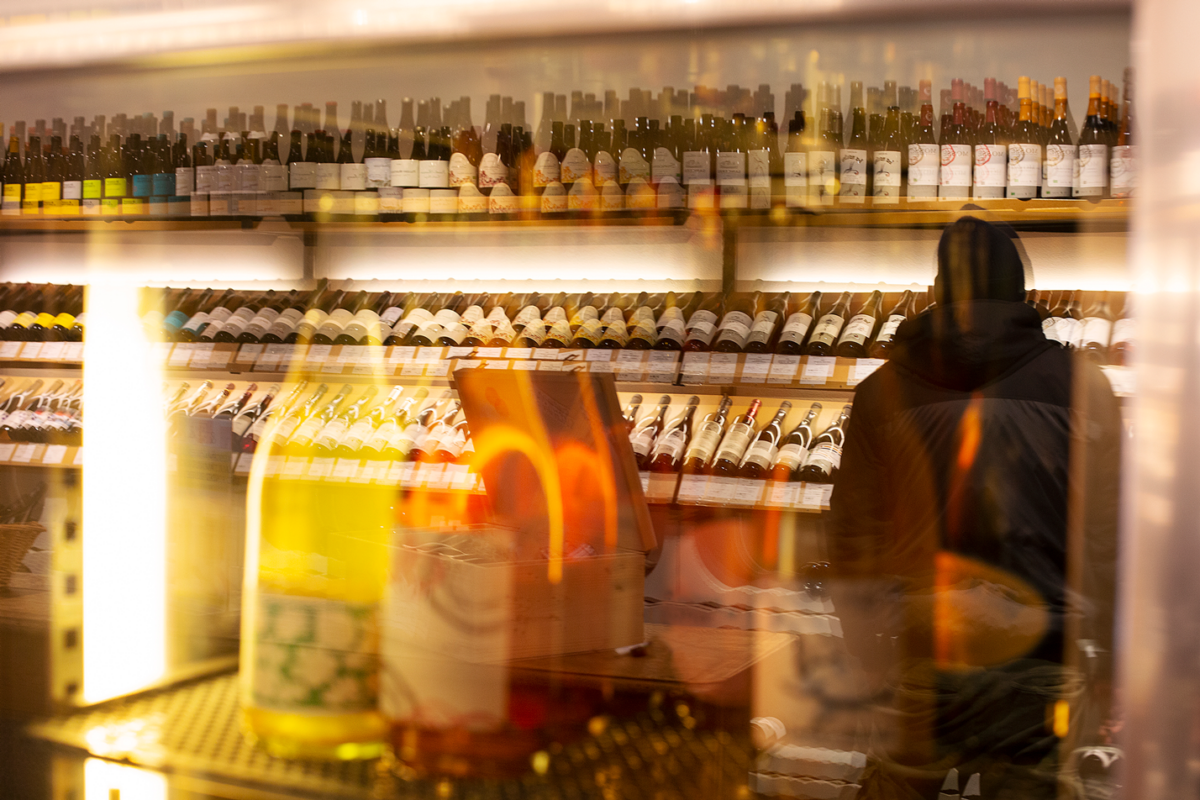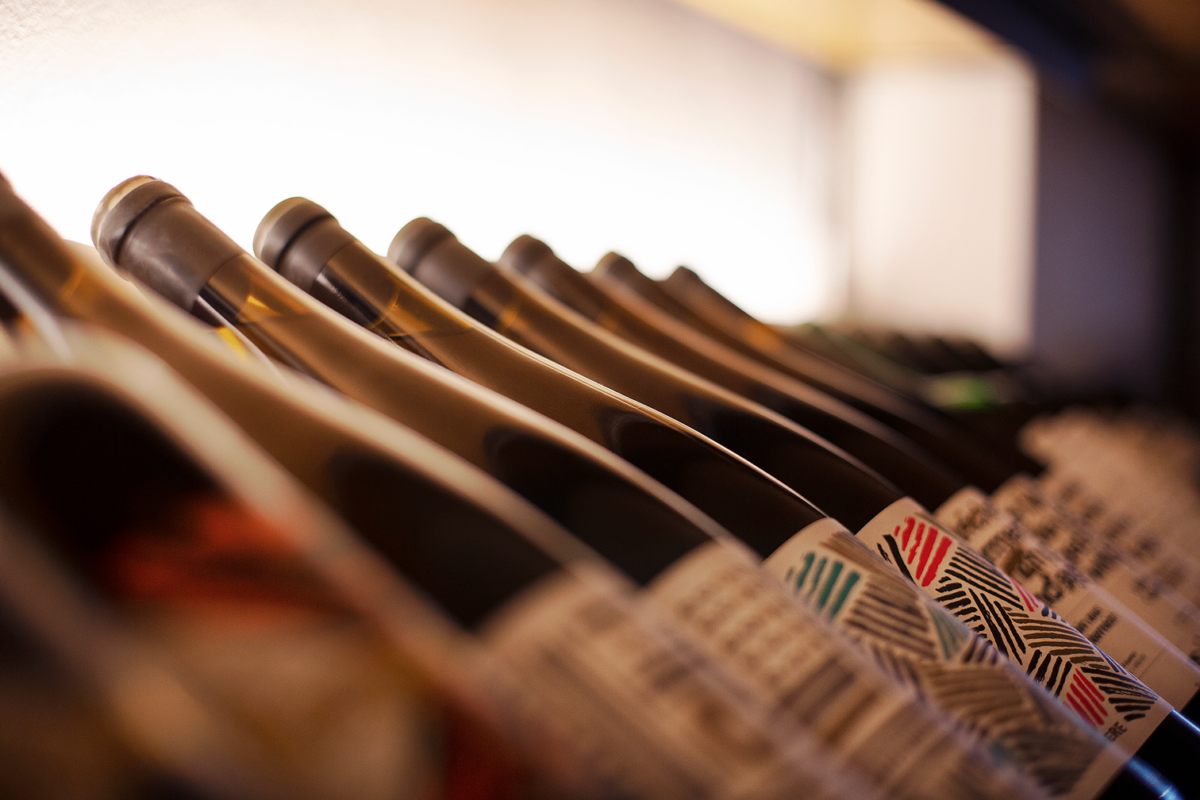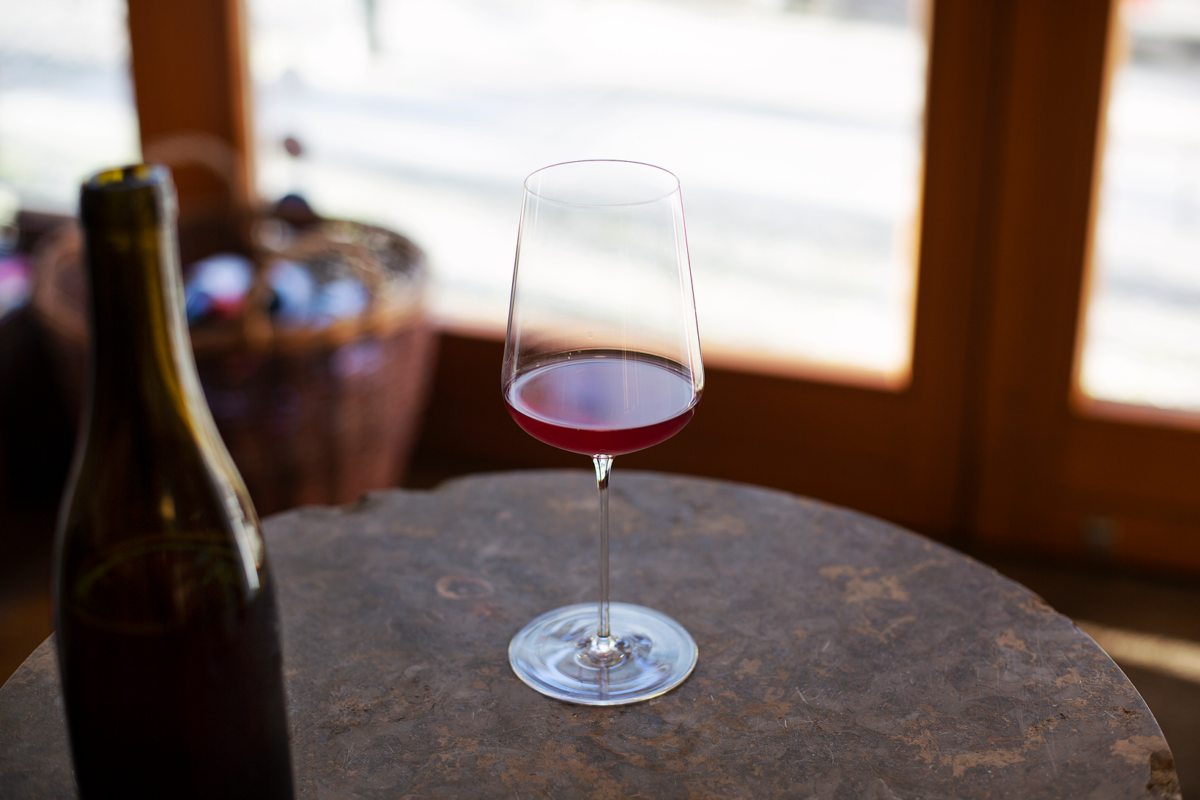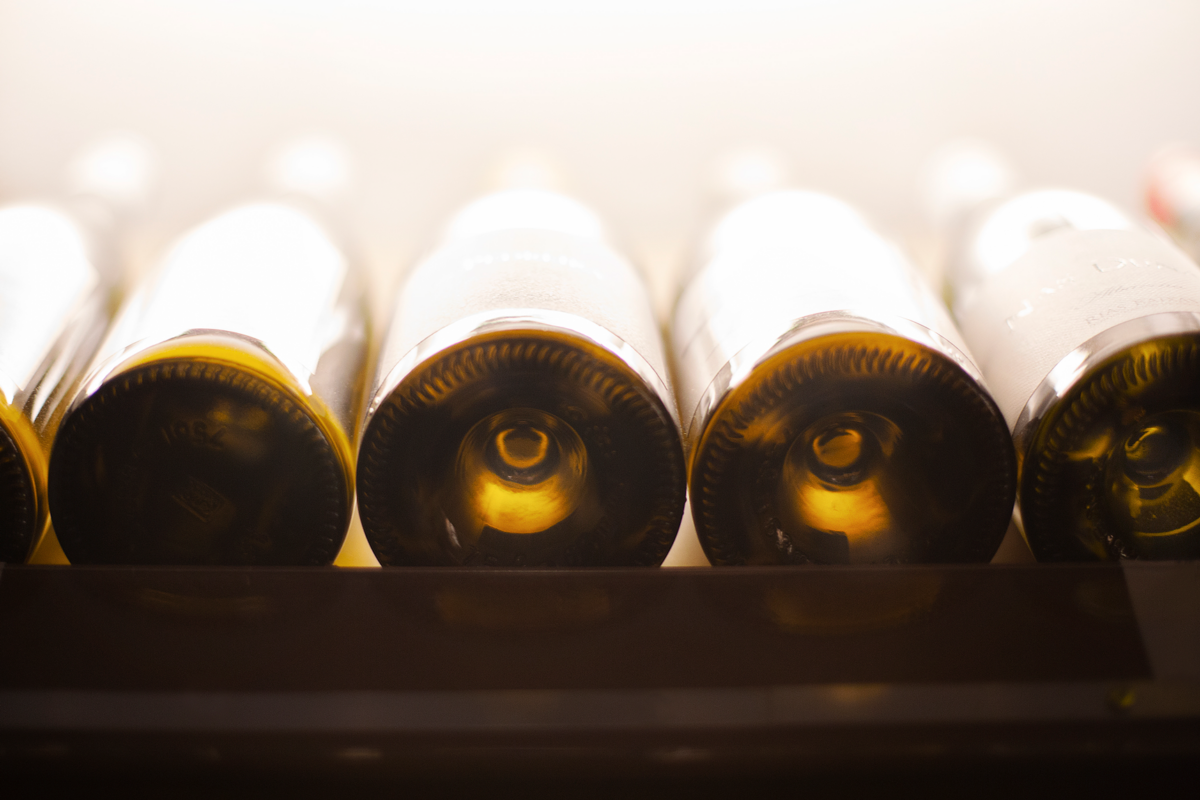Viniculture
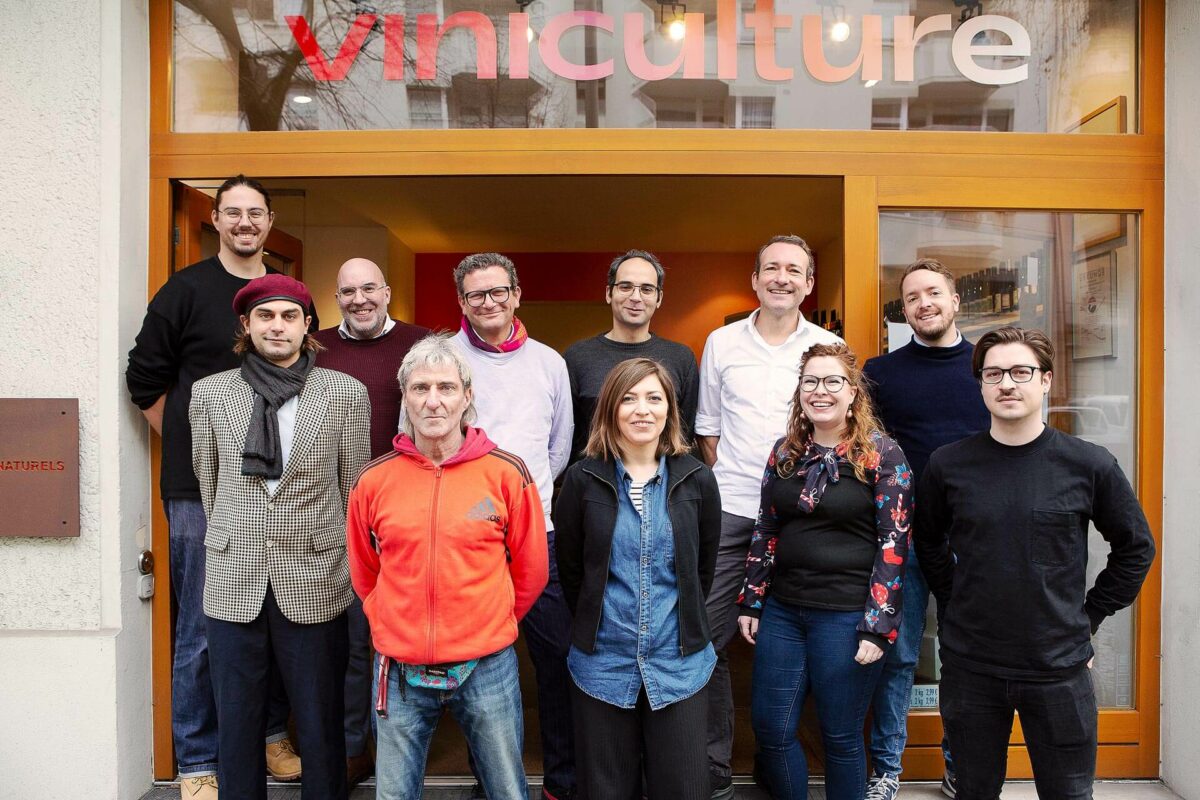
Please introduce yourselves briefly. Who are you, what is the name of your company and where is it located?
Viniculture was one of the first wine stores in Germany to specialize in natural wine. We import our wines directly from small producers in different European countries, and we work closely with restaurants – mainly in Berlin, more and more in other cities. But we still have our store at Grolmanstr. 44-45 in Berlin, which has been around since the 80s. If you want to get to know us, feel free to come by.
What is the difference to other wine stores? What is special about Viniculture?
If you break it down: our team and our assortment! Somehow Holger [Schwarz] has managed to gather a group of really special people here who are all passionate about their job. You will hardly find another store with as many dedicated and seriously competent people working here as we do. Many of them come from a hospitality background, which is extremely helpful when you work with a lot of restaurants. But also the assortment is special: because we started working with natural wines so early, we are allowed to import many great winemakers who had difficulties selling their wines back then – wines that today don’t even end up on the shelves anymore.
“Too often we see our colleagues who work in a similar way to us as competitors, instead of working together to expand our niche, in which we have both an economic and a social interest.”
Ihr seid in der Naturweinszene seit langem etabliert. Naturwein ist seit wenigen Jahren auf den Weinkarten zu finden und auch eher in Großstädten. Warum habt ihr euch früh dafür entschieden, euch darauf zu fokussieren?
Wenn man Holger fragt, hatte das damals hauptsächlich mit Langeweile zu tun. Um 2006 herum hat er schon etwa 10 Jahre bei Viniculture gearbeitet, das damals noch dem Vorbesitzer gehörte. Das Sortiment war klassisch, die Weine weitgehend uniform. Holger hatte damals schon das ganze Karussell der Sommelierie durchlaufen: Restaurants, Wettbewerbe, etc. – und langsam wurden ihm die Weine zu eintönig. Und als er dann eines Tages in Spanien auf den Bassots von Joan Ramón Escoda-Sanahuja probierte (einen maischevergorenen, also „orangenen” Chenin blanc aus Katalonien), machte es bei ihm direkt Klick: das war vollkommen anders als alles, was er vorher getrunken hatte, wild, stoffig und ungestüm. Der Einstieg war also zunächst vor allem ein sensorischer. Die Gedanken an ökologischen Anbau, Biodynamie, usw. kamen erst später, als Holger sich auf die Suche nach dem Grund dafür machte, warum die Weine so anders waren.
Wie hat sich die Trinkkultur in den letzten Jahren verändert? Wo habt ihr in den letzten Jahren eine spürbare Veränderung erlebt?
Wein ist in den letzten Jahren jünger und modischer geworden. Naturwein ist nicht nur durch den ökologischen Anspruch, sondern auch durch die oft buntere und frechere Aufmachung zu einem life style Produkt geworden, das zum Fotografieren und Teilen einlädt. Das ist eine der schönen Seiten des Zusammentreffens von Naturwein und den sozialen Medien: das bessere, nachhaltigere Produkt aus kleiner Produktion, bekommt wegen seines ungewöhnlichen Designs und der begrenzten Verfügbarkeit plötzlich einen gewissen Sex-Appeal, weil der Wein als Distinktionsmerkmal funktioniert. Es ist schön, wenn Nachhaltigkeit mal gut zu vermarkten ist. Eine andere Beobachtung: die Menschen (wenigstens in Berlin) gehen immer bewusster mit ihrem Alkoholkonsum um. Wir haben vor kurzem angefangen, auch mit hochwertigen alkoholfreien Produkten zu arbeiten
– und die Nachfrage ist gewaltig!
Es geht eigentlich immer um möglichst langfristige, direkte Beziehungen, um ihnen und uns das Planen zu ermöglichen und zu erleichtern
– und dem ökonomischen Faktor einen menschlichen an die Seite zu stellen.
You have a particularly close relationship with your winemakers, what difference does that make?
There are quite a few. On the one hand, there is a certain relationship of trust that allows the winemakers to take more risks here and there (for example, not to sulfurize a wine): we guarantee that we will purchase the quantity and trust the skill of the respective person – which is only possible because we know the people behind the wines well. The result is, for example, joint project wines. But in general there is simply more exchange: about what the winemakers would like to do, and about what we can sell and how. We always try to make as much as possible for our producers. In practice, however, it also has a lot to do with the coordination of deliveries, payment terms etc. Not very romantic, but important!
It is actually always about long-term, direct relationships, to enable and facilitate planning for them and for us
– and to put a human factor alongside the economic factor.
“It’s really always about long-term, direct relationships as much as possible, to enable and facilitate planning for them and for us – and to put a human factor alongside the economic factor.”
Wine is one of the few agricultural products that are more highly valued and appreciated. What can farmers learn from winemakers?
Storytelling and scarcity. The special thing about wine is ultimately its specificity: a certain wine from a certain grape variety, from a certain place, from a certain year, made by a certain person in a certain way. This provides comparability without interchangeability. However, wine is not the same as simply “just” grapes: wine is a lavishly processed product, perhaps more comparable to cheese than carrots. So perhaps the other point that is difficult to implement would be: finding ways to add value that allow for further specificity.
How do you think networking and appreciation of good products can happen in other areas of agriculture?
The identity of certain varieties would need to be more concrete. So far, certain products from certain regions are known – for example, asparagus from Beelitz – but apart from farmers or chefs, no one knows WHAT actually distinguishes it. Coffee, for example, does the same: country + variety + method + roasting = individual profile. The problem is perhaps that the packaging is super important for wines (and coffee), and often makes the things shareable and recognizable on social media in the first place. Without the symbolic capital purchased along with the product, it will probably be difficult to adorn oneself with the corresponding lifestyle. This would again speak in favor of further processed products that could be packaged in a fancier way. Presumably, however, the value-enhancing route via the restaurant trade makes more sense. Restaurants would have to be “allowed” to be more expensive – and people would need more money on average, and would have to spend more of it on food.
“Small-scale and complex cultivation, the sacrifice of mechanization in the vineyard and in the cellar, the risk to which especially natural winegrowers expose themselves, all this has its price. […]
We plead then (similar to meat) to rather consume less but better, but overall it is simply not appropriate to only preach renunciation in an economy with so much inequality.”
You pay special attention to the people behind the wine bottles in your communication work. Why? Does this change buying behavior?
Yes, both in the short term and the long term. In the short term, it allows for more human, personal storytelling about our wines, which are actually grown and made by people we know personally. It gives the wines an extra dimension that wouldn’t otherwise be there, just as it allows us to be more emphatic in our storytelling. You talk differently about people you know than strangers. In the long run, it binds customers to producers, like the author of their favorite book: it makes them curious about new wines and vintages, it makes them want to build some kind of personal relationship with the products, maybe even get to know the people behind them and attend relevant events. The customers then also prefer to post and write on social media. Winemakers have fans, and that is a much more intense connection than just buying a product.
The wine world is often portrayed as elitist. Do only wealthy people drink good wine?
More often than we would like, yes. Small-scale and elaborate cultivation, the renunciation of mechanization in the vineyard and in the cellar, the risk to which especially natural winegrowers expose themselves, all this has its price. It is therefore difficult to find “real” natural wines for less than about 10 euros. When you consider that Germans spend on average only about 3 euros for a liter of wine, you have to call it somewhat elitist. We then plead (similar to meat) to rather consume less but better, but overall it is simply not appropriate in an economy with so much inequality to only preach renunciation. One definite advantage to natural wine is that it has broken with many conventions that have long associated wine with a lot of cultural capital and secret knowledge. It’s also increasingly forming its own subculture, with its own labels and rules, but overall it’s still more open and less elitist than the old regime of the conventional, conservative wine world.
“We certainly need to continue to advocate for a change in cultivation […]. Permaculture and regenerative agriculture are currently leading the way here.[…] Pay is quite modest throughout the scene and along the entire value chain, and as in other parts of society, sexism and racism are too rarely addressed in the industry, so related injustices persist.”
The wine world is also becoming political. What issues are important for the future and what must be advocated?
The missions are diverse. We must certainly continue to work for a change in cultivation: more winegrowers must work organically, and those who already do so should take steps away from the monoculture that is omnipresent in viticulture. Permaculture and regenerative agriculture are currently leading the way. But in viticulture and in the wine scene more generally, social justice issues are also important (or should be): pay is pretty modest throughout the scene and along the value chain, and as in other parts of society, sexism and racism are too rarely addressed in the industry- so related injustices persist.
As a retailer, you stand between the winemakers and consumers. The trade is often accused of taking too high margins, and it tends to have a bad image. Where do you see potential to support artisanal production and good agriculture?
Especially in the development of winemakers, or styles and brands. There is a tipping point at some point where a producer is so well known and the products are so in demand that the (intermediate) retailers might really be redundant, apart from their role in logistics and distribution. However, many customers, whether private or in gastronomy, get to know certain wines at all, because importers and distributors do the work of scouting and take the first risk to buy the products. In this way, they also ensure the direct payment of larger quantities to the producers (often over longer periods of time), and thus give them planning security. Winegrowers do not necessarily always have the expertise and the leisure or time to market their wines. To a certain extent we take on the role of agent for many of our winegrowers. Ultimately, our expertise in these matters must help sell the wines at the prices that allow our producers to farm well in the long term. These prices are often somewhat higher and require correspondingly more explaining and convincing.
“We need much more exchange, especially with people outside our bubble. […] But also in our bubble of the wine world, a rethinking is needed. […] Last but not least, it is simply inspiring to exchange ideas with other people who are similarly passionate about good products from good agriculture. This occasionally reminds us why we are doing all this in the first place.”
Where does sharing knowledge play a role for you?
Always and everywhere. Natural wine was (and still is) a product in need of explanation: the wines look, smell, and taste different than people are often used to (even though normality has changed in cities in recent years), and they often cost more. In our work with both consumers and the restaurant trade, we therefore have to do a lot of explaining and telling. We also have to be at a standard that allows us to work at eye level with some of the best sommeliers and sommelières in Germany. In addition, we are also in constant exchange with our winemakers, where we can help each other a lot. In a way, we are at the interface of all parties involved, and this interface distributes not only wine, but also knowledge and information.
Why did you become a member of Die Gemeinschaft?
Precisely because we have so many points of contact with so many people at all levels of the value chain, we are very aware that none of us can survive in isolation. We are enmeshed in a web of interdependencies, so that action (including political action) is only possible if everyone moves together in the same direction. We find it exciting what possibilities for exchange and joint action Die Gemeinschaft enables us to do in the Berlin area.
The wine world is already pretty well connected. Where do you see potential in further networking? And where do you need more of it?
We need a lot more exchange, especially with people outside our bubble. Especially on the agricultural side, the exchange is extremely fruitful: for example when a winemaker exchanges ideas with a shepherdess and they decide to do something together. Especially for the step out of the monoculture in viticulture, more knowledge is needed, especially practical knowledge. But also in our bubble of the wine world we need rethinking. Too often we see our colleagues who work in a similar way to us as competitors, instead of working together to expand our niche, in which we have both an economic and a social interest. Last but not least, it is simply inspiring to exchange ideas with other people who are similarly passionate about good products from good agriculture. It occasionally reminds us why we are doing all this in the first place. That gives us a long breath – and we will need it.
Photos:
Zoe Spawton
